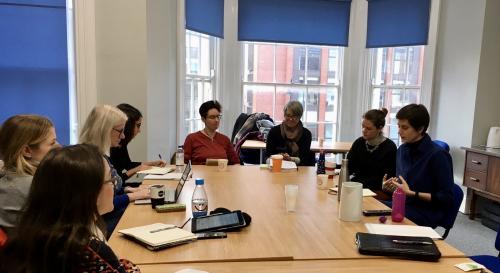
Breadcrumbs navigation
The politics of (non-)knowledge at Europe's borders: Errors, fakes, and subjectivity
In this short summary, authors Claudia Aradau and Sarah Perret summarise the key points from their Review of International Studies article.
From statistical calculations to psychological knowledge, from profiling to scenario planning, and from biometric data to predictive algorithms, International Relations scholars have shed light on the multiple forms of knowledge deployed in the governing of populations and their political effects. Claudia and Sarah's article proposes to advance these conversations on governing through non-knowledge by nuancing the analysis of power/(non-)knowledge/subjectivity relations.
You can read the full article at: https://doi.org/10.1017/S0260210522000080
This particular article is open access, however BISA members receive access to all articles in RIS (and our other journal European Journal of International Security) as a benefit of membership. To gain access log in to your BISA account and scroll down to the 'Membership benefits' section. If you're not yet a member join today.
Full abstract
From statistical calculations to psychological knowledge, from profiling to scenario planning, and from biometric data to predictive algorithms, International Relations scholars have shed light on the multiple forms of knowledge deployed in the governing of populations and their political effects. Recent scholarship in critical border and security studies has drawn attention to ‘the other side of knowledge’ and has developed a vibrant conversation with the emergent interdisciplinary field of ignorance studies. This article proposes to advance these conversations on governing through non-knowledge by nuancing the analysis of power/(non-)knowledge/subjectivity relations. Firstly, we expand the analysis of non-knowledge by attending to the problematisation of errors and fakes in controversies at Europe's borders. Errors have emerged in relation to border actors’ practices and technologies, while migrant practices, documentation, and narratives are deemed to be potentially ‘fake’, ‘fraudulent’, or ‘false’. Secondly, we explore how different subjectivities are produced through regimes of error/truth and fake/authenticity. We argue that there are important epistemic differences between ‘fake’ and ‘error’, that they are entangled with different techniques of power and produce highly differentiated subjectivities. Finally, we attend to how these subjectivities are enacted within racialised hierarchies and ask whether non-knowledge can be mobilised to challenge these hierarchies.
Photo by Subhashish Panigrahi. Licensed under the Creative Commons Attribution-Share Alike 4.0 International license.


